全新版大学英语综合教程2课文原文及翻译.pdf
- 格式:pdf
- 大小:89.33 KB
- 文档页数:7
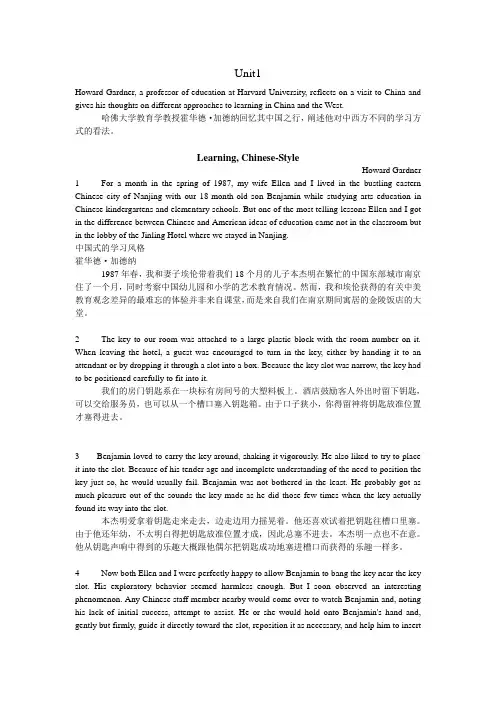
Unit1Howard Gardner, a professor of education at Harvard University, reflects on a visit to China and gives his thoughts on different approaches to learning in China and the West.哈佛大学教育学教授霍华德·加德纳回忆其中国之行,阐述他对中西方不同的学习方式的看法。
Learning, Chinese-StyleHoward Gardner 1 For a month in the spring of 1987, my wife Ellen and I lived in the bustling eastern Chinese city of Nanjing with our 18-month-old son Benjamin while studying arts education in Chinese kindergartens and elementary schools. But one of the most telling lessons Ellen and I got in the difference between Chinese and American ideas of education came not in the classroom but in the lobby of the Jinling Hotel where we stayed in Nanjing.中国式的学习风格霍华德·加德纳1987年春,我和妻子埃伦带着我们18个月的儿子本杰明在繁忙的中国东部城市南京住了一个月,同时考察中国幼儿园和小学的艺术教育情况。
然而,我和埃伦获得的有关中美教育观念差异的最难忘的体验并非来自课堂,而是来自我们在南京期间寓居的金陵饭店的大堂。
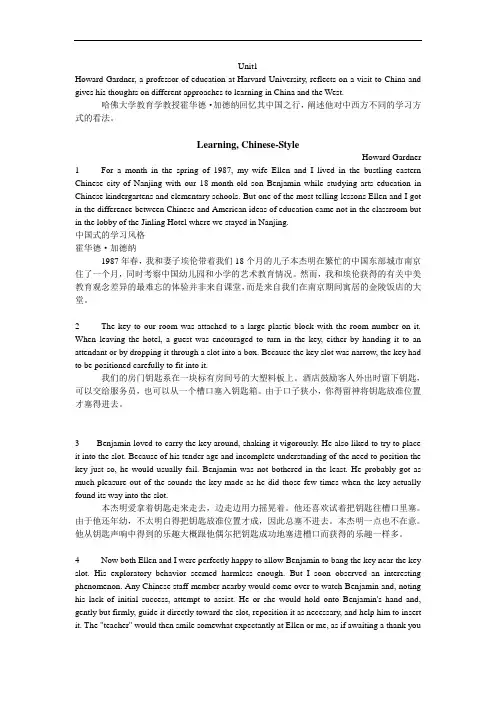
Unit1Howard Gardner, a professor of education at Harvard University, reflects on a visit to China and gives his thoughts on different approaches to learning in China and the West.哈佛大学教育学教授霍华德·加德纳回忆其中国之行,阐述他对中西方不同的学习方式的看法。
Learning, Chinese-StyleHoward Gardner 1 For a month in the spring of 1987, my wife Ellen and I lived in the bustling eastern Chinese city of Nanjing with our 18-month-old son Benjamin while studying arts education in Chinese kindergartens and elementary schools. But one of the most telling lessons Ellen and I got in the difference between Chinese and American ideas of education came not in the classroom but in the lobby of the Jinling Hotel where we stayed in Nanjing.中国式的学习风格霍华德·加德纳1987年春,我和妻子埃伦带着我们18个月的儿子本杰明在繁忙的中国东部城市南京住了一个月,同时考察中国幼儿园和小学的艺术教育情况。
然而,我和埃伦获得的有关中美教育观念差异的最难忘的体验并非来自课堂,而是来自我们在南京期间寓居的金陵饭店的大堂。
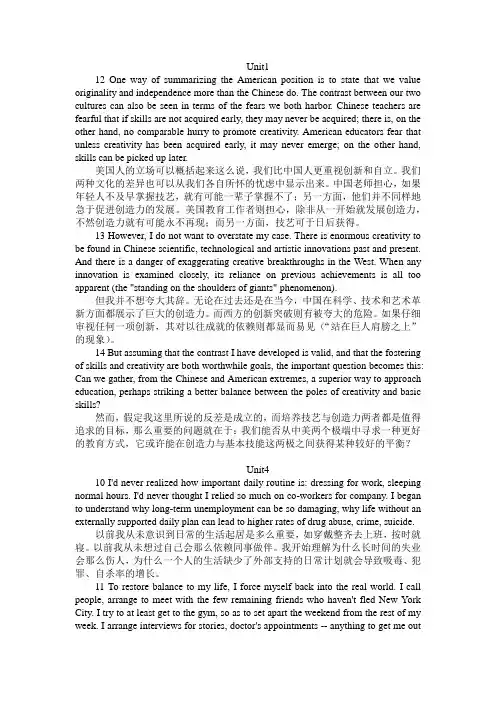
Unit112 One way of summarizing the American position is to state that we value originality and independence more than the Chinese do. The contrast between our two cultures can also be seen in terms of the fears we both harbor. Chinese teachers are fearful that if skills are not acquired early, they may never be acquired; there is, on the other hand, no comparable hurry to promote creativity. American educators fear that unless creativity has been acquired early, it may never emerge; on the other hand, skills can be picked up later.美国人的立场可以概括起来这么说,我们比中国人更重视创新和自立。
我们两种文化的差异也可以从我们各自所怀的忧虑中显示出来。
中国老师担心,如果年轻人不及早掌握技艺,就有可能一辈子掌握不了;另一方面,他们并不同样地急于促进创造力的发展。
美国教育工作者则担心,除非从一开始就发展创造力,不然创造力就有可能永不再现;而另一方面,技艺可于日后获得。
13 However, I do not want to overstate my case. There is enormous creativity to be found in Chinese scientific, technological and artistic innovations past and present. And there is a danger of exaggerating creative breakthroughs in the West. When any innovation is examined closely, its reliance on previous achievements is all too apparent (the "standing on the shoulders of giants" phenomenon).但我并不想夸大其辞。
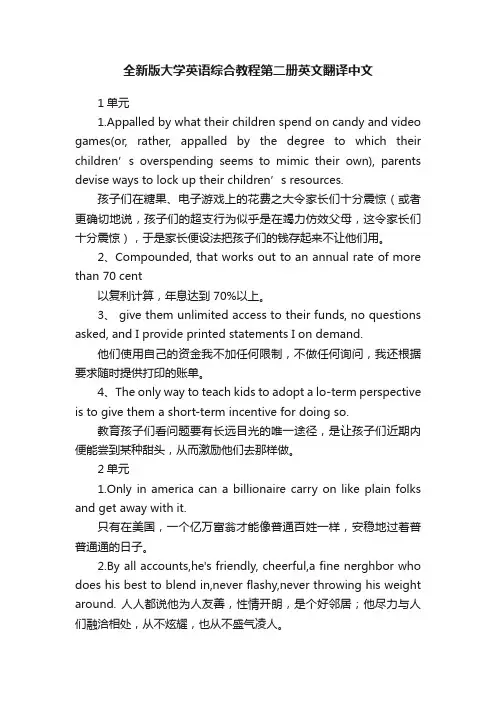
全新版大学英语综合教程第二册英文翻译中文1单元1.Appalled by what their children spend on candy and video games(or, rather, appalled by the degree to which their children’s overspending seems to mimic their own), parents devise ways to lock up their children’s resources.孩子们在糖果、电子游戏上的花费之大令家长们十分震惊(或者更确切地说,孩子们的超支行为似乎是在竭力仿效父母,这令家长们十分震惊),于是家长便设法把孩子们的钱存起来不让他们用。
2、Compounded, that works out to an annual rate of more than 70 cent以复利计算,年息达到 70%以上。
3、 give them unlimited access to their funds, no questions asked, and I provide printed statements I on demand.他们使用自己的资金我不加任何限制,不做任何询问,我还根据要求随时提供打印的账单。
4、The only way to teach kids to adopt a lo-term perspective is to give them a short-term incentive for doing so.教育孩子们看问题要有长远目光的唯一途径,是让孩子们近期内便能尝到某种甜头,从而激励他们去那样做。
2单元1.Only in america can a billionaire carry on like plain folks and get away with it.只有在美国,一个亿万富翁才能像普通百姓一样,安稳地过着普普通通的日子。
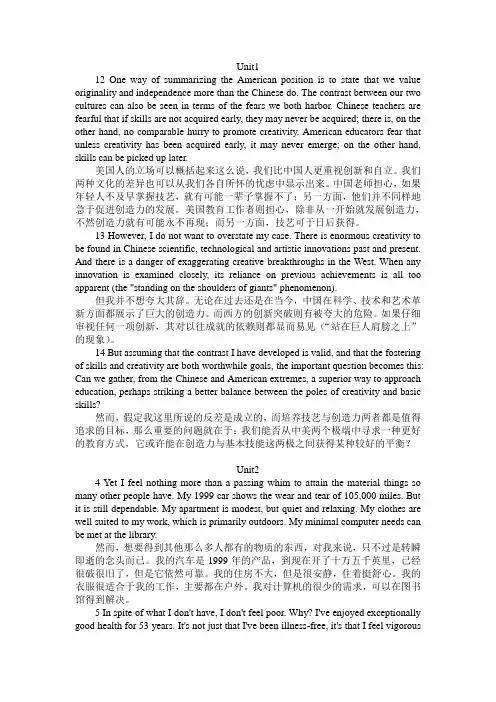
Unit112 One way of summarizing the American position is to state that we value originality and independence more than the Chinese do. The contrast between our two cultures can also be seen in terms of the fears we both harbor. Chinese teachers are fearful that if skills are not acquired early, they may never be acquired; there is, on the other hand, no comparable hurry to promote creativity. American educators fear that unless creativity has been acquired early, it may never emerge; on the other hand, skills can be picked up later.美国人的立场可以概括起来这么说,我们比中国人更重视创新和自立。
我们两种文化的差异也可以从我们各自所怀的忧虑中显示出来。
中国老师担心,如果年轻人不及早掌握技艺,就有可能一辈子掌握不了;另一方面,他们并不同样地急于促进创造力的发展。
美国教育工作者则担心,除非从一开始就发展创造力,不然创造力就有可能永不再现;而另一方面,技艺可于日后获得。
13 However, I do not want to overstate my case. There is enormous creativity to be found in Chinese scientific, technological and artistic innovations past and present. And there is a danger of exaggerating creative breakthroughs in the West. When any innovation is examined closely, its reliance on previous achievements is all too apparent (the "standing on the shoulders of giants" phenomenon).但我并不想夸大其辞。
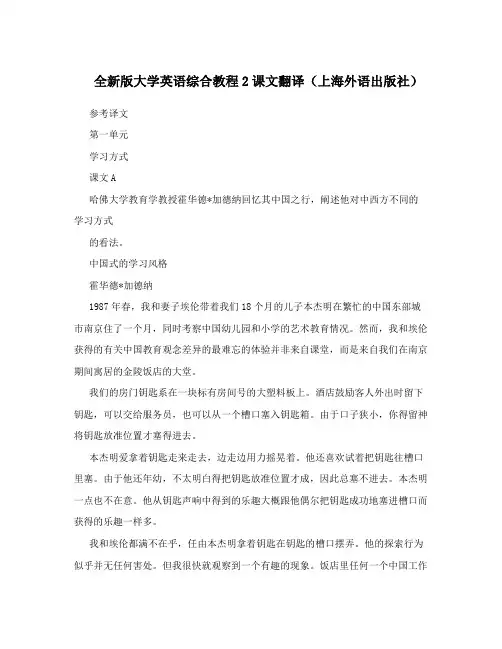
全新版大学英语综合教程2课文翻译(上海外语出版社)参考译文第一单元学习方式课文A哈佛大学教育学教授霍华德*加德纳回忆其中国之行,阐述他对中西方不同的学习方式的看法。
中国式的学习风格霍华德*加德纳1987年春,我和妻子埃伦带着我们18个月的儿子本杰明在繁忙的中国东部城市南京住了一个月,同时考察中国幼儿园和小学的艺术教育情况。
然而,我和埃伦获得的有关中国教育观念差异的最难忘的体验并非来自课堂,而是来自我们在南京期间寓居的金陵饭店的大堂。
我们的房门钥匙系在一块标有房间号的大塑料板上。
酒店鼓励客人外出时留下钥匙,可以交给服务员,也可以从一个槽口塞入钥匙箱。
由于口子狭小,你得留神将钥匙放准位置才塞得进去。
本杰明爱拿着钥匙走来走去,边走边用力摇晃着。
他还喜欢试着把钥匙往槽口里塞。
由于他还年幼,不太明白得把钥匙放准位置才成,因此总塞不进去。
本杰明一点也不在意。
他从钥匙声响中得到的乐趣大概跟他偶尔把钥匙成功地塞进槽口而获得的乐趣一样多。
我和埃伦都满不在乎,任由本杰明拿着钥匙在钥匙的槽口摆弄。
他的探索行为似乎并无任何害处。
但我很快就观察到一个有趣的现象。
饭店里任何一个中国工作人员若在近旁,都会走过来看着本杰明,见他初试失败,便都会试图帮忙。
他们会轻轻握紧本杰明的手,直接将它引向钥匙的槽口,进行必要的重新定位,并帮他把钥匙插入槽口。
然后那位"老师"会有所期待地对着我和埃伦微笑,似乎等着我们说声谢谢--偶尔他会微微皱眉,似乎觉得我俩没有尽到当父母的责任。
我很快意识到,这件小事与我们在中国要做的工作直接相关:考察儿童早期教育 (尤其是艺术教育)的方式,揭示中国人对创造性活动的态度。
因此,不久我就在与中国教育工作者讨论时谈起了钥匙槽口一事。
两种不同的学习方式我的中国同行,除了少数几个人外,对此事的态度与金陵饭店工作人员一样。
"既然大人知道怎么把钥匙塞进槽口--这是处理槽口一事的最终目的,既然孩子还很年幼,还没有灵巧到可以独自完成要做的动作,让他自己瞎折腾会有什么好处呢?他很有可能会灰心丧气发脾气--这当然不是所希望的结果。
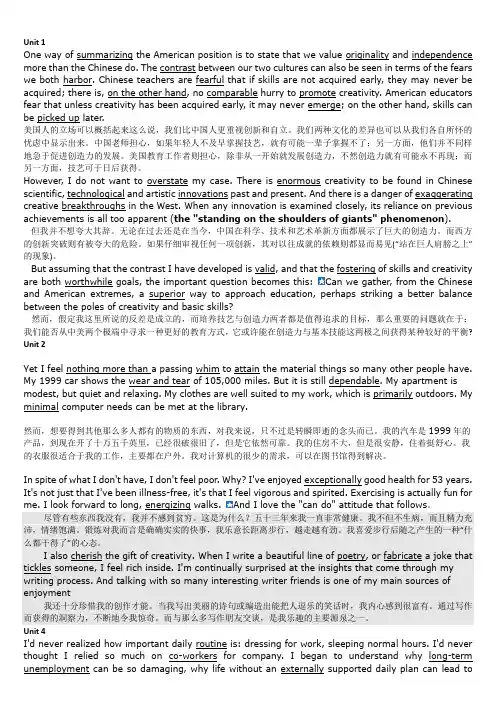
Unit 1One way of summarizing the American position is to state that we value originality and independence more than the Chinese do. The contrast between our two cultures can also be seen in terms of the fears we both harbor. Chinese teachers are fearful that if skills are not acquired early, they may never be acquired; there is, on the other hand, no comparable hurry to promote creativity. American educators fear that unless creativity has been acquired early, it may never emerge; on the other hand, skills can be picked up later.美国人的立场可以概括起来这么说,我们比中国人更重视创新和自立。
我们两种文化的差异也可以从我们各自所怀的忧虑中显示出来。
中国老师担心,如果年轻人不及早掌握技艺,就有可能一辈子掌握不了;另一方面,他们并不同样地急于促进创造力的发展。
美国教育工作者则担心,除非从一开始就发展创造力,不然创造力就有可能永不再现;而另一方面,技艺可于日后获得。
However, I do not want to overstate my case. There is enormous creativity to be found in Chinese scientific, technological and artistic innovations past and present. And there is a danger of exaggerating creative breakthroughs in the West. When any innovation is examined closely, its reliance on previous achievements is all too apparent (the "standing on the shoulders of giants" phenomenon).但我并不想夸大其辞。
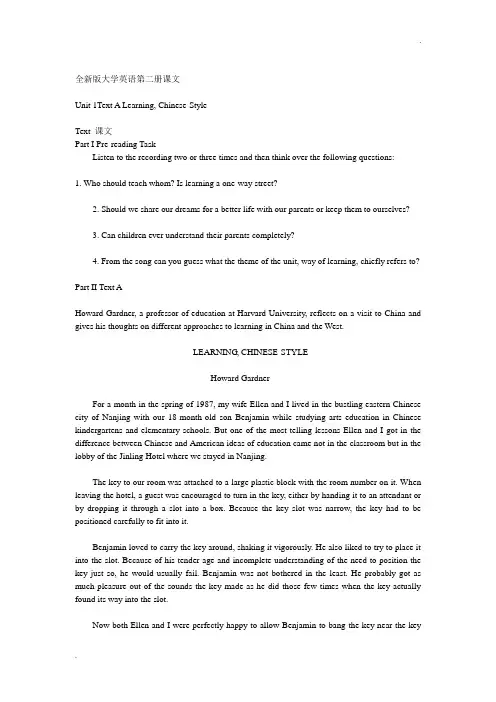
全新版大学英语第二册课文Unit 1Text A Learning, Chinese-StyleText 课文Part I Pre-reading TaskListen to the recording two or three times and then think over the following questions:1. Who should teach whom? Is learning a one-way street?2. Should we share our dreams for a better life with our parents or keep them to ourselves?3. Can children ever understand their parents completely?4. From the song can you guess what the theme of the unit, way of learning, chiefly refers to?Part II Text AHoward Gardner, a professor of education at Harvard University, reflects on a visit to China and gives his thoughts on different approaches to learning in China and the West.LEARNING, CHINESE-STYLEHoward GardnerFor a month in the spring of 1987, my wife Ellen and I lived in the bustling eastern Chinese city of Nanjing with our 18-month-old son Benjamin while studying arts education in Chinese kindergartens and elementary schools. But one of the most telling lessons Ellen and I got in the difference between Chinese and American ideas of education came not in the classroom but in the lobby of the Jinling Hotel where we stayed in Nanjing.The key to our room was attached to a large plastic block with the room number on it. When leaving the hotel, a guest was encouraged to turn in the key, either by handing it to an attendant or by dropping it through a slot into a box. Because the key slot was narrow, the key had to be positioned carefully to fit into it.Benjamin loved to carry the key around, shaking it vigorously. He also liked to try to place it into the slot. Because of his tender age and incomplete understanding of the need to position the key just so, he would usually fail. Benjamin was not bothered in the least. He probably got as much pleasure out of the sounds the key made as he did those few times when the key actually found its way into the slot.Now both Ellen and I were perfectly happy to allow Benjamin to bang the key near the keyslot. His exploratory behavior seemed harmless enough. But I soon observed an interesting phenomenon. Any Chinese staff member nearby would come over to watch Benjamin and, noting his lack of initial success, attempt to assist. He or she would hold onto Benjamin's hand and, gently but firmly, guide it directly toward the slot, reposition it as necessary, and help him to insert it. The "teacher" would then smile somewhat expectantly at Ellen or me, as if awaiting a thank you — and on occasion would frown slightly, as if considering us to be neglecting our parental duties.I soon realized that this incident was directly relevant to our assigned tasks in China: to investigate the ways of early childhood education (especially in the arts), and to throw light on Chinese attitudes toward creativity. And so before long I began to introduce the key-slot anecdote into my discussions with Chinese educators.TWO DIFFERENT W AYS TO LEARNWith a few exceptions my Chinese colleagues displayed the same attitude as the staff at the Jinling Hotel. Since adults know how to place the key in the key slot, which is the ultimate purpose of approaching the slot, and since the child is neither old enough nor clever enough to realize the desired action on his own, what possible gain is achieved by having him struggle? He may well get frustrated and angry — certainly not a desirable outcome. Why not show him what to do? He will be happy, he will learn how to accomplish the task sooner, and then he can proceed to more complex activities, like opening the door or asking for the key—both of which accomplishments can (and should) in due course be modeled for him as well.We listened to such explanations sympathetically and explained that, first of all, we did not much care whether Benjamin succeeded in inserting the key into the slot. He was having a good time and was exploring, two activities that did matter to us. But the critical point was that, in the process, we were trying to teach Benjamin that one can solve a problem effectively by oneself. Such self-reliance is a principal value of child rearing in middle-class America. So long as the child is shown exactly how to do something — whether it be placing a key in a key slot, drawing a hen or making up for a misdeed — he is less likely to figure out himself how to accomplish such a task. And, more generally, he is less likely to view life —as Americans do —as a series of situations in which one has to learn to think for oneself, to solve problems on one's own and even to discover new problems for which creative solutions are wanted.TEACHING BY HOLDING HIS HANDIn retrospect, it became clear to me that this incident was indeed key — and key in more than one sense. It pointed to important differences in the educational and artistic practices in our two countries.When our well-intentioned Chinese observers came to Benjamin's rescue, they did not simply push his hand down clumsily or uncertainly, as I might have done. Instead, they guided him with extreme facility and gentleness in precisely the desired direction. I came to realize that these Chinese were not just molding and shaping Benjamin's performance in any old manner: In the bestChinese tradition, they were ba zhe shoujiao — "teaching by holding his hand" — so much so that he would happily come back for more.The idea that learning should take place by continual careful shaping and molding applies equally to the arts. Watching children at work in a classroom setting, we were astonished by their facility. Children as young as 5 or 6 were painting flowers, fish and animals with the skill and confidence of an adult; calligraphers 9 and 10 years old were producing works that could have been displayed in a museum. In a visit to the homes of two of the young artists, we learned from their parents that they worked on perfecting their craft for several hours a day.CREATIVITY FIRST?In terms of attitudes to creativity there seems to be a reversal of priorities: young Westerners making their boldest departures first and then gradually mastering the tradition; and young Chinese being almost inseparable from the tradition, but, over time, possibly evolving to a point equally original.One way of summarizing the American position is to state that we value originality and independence more than the Chinese do. The contrast between our two cultures can also be seen in terms of the fears we both harbor. Chinese teachers are fearful that if skills are not acquired early, they may never be acquired; there is, on the other hand, no comparable hurry to promote creativity. American educators fear that unless creativity has been acquired early, it may never emerge; on the other hand, skills can be picked up later.However, I do not want to overstate my case. There is enormous creativity to be found in Chinese scientific, technological and artistic innovations past and present. And there is a danger of exaggerating creative breakthroughs in the West. When any innovation is examined closely, its reliance on previous achievements is all too apparent (the "standing on the shoulders of giants" phenomenon ).But assuming that the contrast I have developed is valid, and that the fostering of skills and creativity are both worthwhile goals, the important question becomes this: Can we gather, from the Chinese and American extremes, a superior way to approach education, perhaps striking a better balance between the poles of creativity and basic skills?(1182 words)Unit 2 Text A The Richest Man In America, Down HomeText 课文Part I Pre-reading TaskListen to the recording two or three times and then think over the following questions:1. Who is it about?2. What happened to him one day?3. Do you think it was worthwhile to walk two or three miles to pay back the six and a quarter cents?4. Is the story related to the theme of the unit — values?The following words in the recording may be new to you:dismayn. 沮丧,失望disturbvt. 使不安conscientiousa. 认真的,尽职的Part II Text ADoes being rich mean you live a completely different life from ordinary people? Not, it seems, if your name is Sam Walton.THE RICHEST MAN IN AMERICA, DOWN HOMEArt HarrisHe put on a dinner jacket to serve as a waiter at the birthday party of The Richest Man in America. He imagined what surely awaited: a mansion, a "Rolls-Royce for every day of the week," dogs with diamond collars, servants everywhere.Then he was off to the house, wheeling past the sleepy town square in Bentonville, a remote Arkansas town of 9,920, where Sam Walton started with a little dime store that grew into a $6 billion discount chain called Wal-Mart. He drove down a country road, turned at a mailbox marked "Sam and Helen Walton," and jumped out at a house in the woods.It was nice, but no palace. The furniture appeared a little worn. An old pickup truck sat in the garage and a muddy bird dog ran about the yard. He never spotted any servants."It was a real disappointment," sighs waiter Jamie Beaulieu.Only in America can a billionaire carry on like plain folks and get away with it. And the 67-year-old discount king Sam Moore Walton still travels these windy back roads in his 1979 Ford pickup, red and white, bird dogs by his side, and, come shooting season, waits in line like everyone else to buy shells at the local Wal-Mart."He doesn't want any special treatment," says night manager Johnny Baker, who struggles to call the boss by his first name as a recent corporate memo commands. Few here think of his billions; they call him "Mr. Sam" and accept his folksy ways. "He's the same man who opened his dime store on the square and worked 18 hours a day for his dream," says Mayor Richard Hoback.By all accounts, he's friendly, cheerful, a fine neighbor who does his best to blend in, never flashy, never throwing his weight around.No matter how big a time he had on Saturday night, you can find him in church on Sunday. Surely in a reserved seat, right? "We don't have reserved seats," says Gordon Garlington III, pastor of the local church.So where does The Richest Man in America sit? Wherever he finds a seat. "Look, he's just not that way. He doesn't have a set place. At a church supper the other night, he and his wife were in back washing dishes."For 19 years, he's used the same barber. John Mayhall finds him waiting when he opens up at 7 a.m. He chats about the national news, or reads in his chair, perhaps the Benton County Daily Democrat, another Walton property that keeps him off the front page. It buried the Forbes list at the bottom of page 2."He's just not a front-page person," a newspaper employee explains.But one recent morning, The Richest Man in America did something that would have made headlines any where in the world: He forgot his money. "I said, 'Forget it, take care of it next time,'" says barber Mayhall. "But he said, 'No, I'll get it,' and he went home for his wallet."Wasn't that, well, a little strange? "No sir," says Mayhall, "the only thing strange about Sam Walton is that he isn't strange."But just how long Walton can hold firm to his folksy habits with celebrity hunters keeping following him wherever he goes is anyone's guess. Ever since Forbes magazine pronounced him America's richest man, with $2.8 billion in Wal-Mart stock, he's been a rich man on the run, steering clear of reporters, dreamers, and schemers."He may be the richest by Forbes rankings," says corporate affairs director Jim V on Gremp,"but he doesn't know whether he is or not — and he doesn't care. He doesn't spend much. He owns stock, but he's always left it in the company so it could grow. But the real story in his mind is the success achieved by the 100,000 people who make up the Wal-Mart team."He's usually back home for Friday sales meetings, or the executive pep rally Saturday morning at 7 a.m., when Walton, as he does at new store openings, is liable to jump up on a chair and lead everyone in the Wal-Mart cheer: "Give me a W! Give me an A! Give me an L! Louder!"And louder they yell. No one admits to feeling the least bit silly. It's all part of the Wal-Mart way of life as laid down by Sam: loyalty, hard work, long hours; get ideas into the system from the bottom up, Japanese-style; treat your people right; cut prices and margins to the bone and sleep well at night. Employees with one year on board qualify for stock options, and are urged to buy all they can.After the pep rally, there's bird hunting, or tennis on his backyard court. But his stores are always on his mind. One tennis guest managed to put him off his game by asking why a can of balls cost more in one Wal-Mart than another. It turned out to be untrue, but the move worked. Walton lost four straight games.Walton set up a college scholarship fund for employees' children, a disaster relief fund to rebuild employee homes damaged by fires, floods, tornadoes, and the like. He believed in cultivating ideas and rewarding success."He'd say, 'That fellow worked hard, let's give him a little extra,'" recalls retired president Ferold F. Arend, who was stunned at such generosity after the stingy employer he left to join Wal-Mart. "I had to change my way of thinking when I came aboard.""The reason for our success," says Walton, in a company handout, "is our people and the way they're treated and the way they feel about their company. They believe things are different here, but they deserve the credit."Adds company lawyer Jim Hendren: "I've never seen anyone yet who worked for him or was around him for any length of time who wasn't better off. And I don't mean just financially, although a lot of people are. It's just something about him —coming into contact with Sam Walton just makes you a better person."(1066 words)Unit 2 Text A Father knows BetterText 课文Part I Pre-reading TaskListen to the recording two or three times and then think over the following questions:1. What sort of a song is it?2. Who should be sitting up and taking notice? Why?3. What does the singer think of his parent's way of doing things?4. Do you agree with what he says?The following words in the recording may be new to you:roamvi. 漫游drenchvt. 使湿透prophesizev. 作预言senatorn. 参议员heedvt. 注意stallv. 拖延ragevi. 激烈地进行Part II Text AThis comedy centers around a proud father's attempts to help his children, attempts which somehow or other always end up embarrassing them. For the sake of fun it carries things to extremes, but nearly everyone can recognize something of themselves and their parents in it.FATHER KNOWS BETTERMarsh CassadyCHARACTERS: FATHER; MOTHER; HEIDI, 14; DIANE, 17; SEAN, 16; RESTAURANT MANAGER, 20s; MRS. HIGGINS.SETTING: Various locations including a fast-food restaurant, the Thompson family dining room, and an office at a high school.ATRISE: As the lights come up, HEIDI enters and crosses Down Right to the edge of the stage. SEAN and DIANE enter and cross Down Left to the edge of the stage. They listen as HEIDI addresses the audience.HEIDI: My dad's a nice man. Nobody could possibly believe that he isn't. Yet he's... well, he's always doing these stupid things that end up really embarrassing one or more of us kids. One time, see, my brother wanted to buy this guitar. Been saving money for it for a long time. Then he got a job at this fast-food place, OK? Waiting tables. It was Sean's first actual job, and he was real happy about it. He figured in two or three months he'd have enough money to buy exactly the kind of guitar he wanted. Mom and Dad were proud of him, and well, OK, he's my big brother, and he's always pulling these dumb things on me. But, well, I was proud of him too. You know what happened? I hate to tell you because:SEAN, DIANE and HEIDI: (In unison) Father knows better!(The lights come Up Left on the fast-food restaurant where SEAN works. It consists of a counter and a couple of small tables. The MAN-AGER stands behind the counter. SEAN is busily cleaning the tables when FATHER walks in.)MANAGER: Good evening, sir. May I help you?FATHER: Good evening.SEAN: (To himself) Oh, no!(He squats behind one of the tables trying to hide from FATHER.)FATHER: I'm looking for the manager.MANAGER: That would be me, sir.FATHER: I'm Sam Thompson. My son works here.MANAGER: Oh, you're Sean's father.FATHER: Yes. It's his first job, you know. I just wanted to check that he's doing OK.MANAGER: Oh, fine. No problem.SEAN: (Spreading his hands, palms up, speaking to himself) What did I do to deserve this? Tell me what?FATHER: Hiring him was a good thing then?MANAGER: Well, yeah, I suppose so.SEAN: (Still to himself.) Go home, Dad. Go home. Go home.FATHER: I'm sure he's a good worker but a typical teenager, if you know what I mean.MANAGER: (Losing interest) I wouldn't know.FATHER: He's a good boy. And I assure you that if there are any subjects that need to be addressed, Sean and I will have a man-to-man talk.MANAGER: I don't think that will be necessary...FATHER: Oh, no problem. I'm proud of my son. Very, very proud. And I just wanted you to know that I'll do anything I can to help him through life's dangerous sea.SEAN: (Standing up and screaming) Aaaargh! Aaaargh! Aaaaaaargh!FATHER: Son, I didn't know you were here.SEAN: It's where I work, Dad.FATHER: Of course. I mean, I didn't see you.SEAN: I can't imagine why.FATHER: Your manager and I were just having a nice chat.(DIANE enters Down Left just as HEIDI enters Down Right. They look at SEAN and FATHER.)SEAN, DIANE, HEIDI: (In unison) Father, you know better than that.(The lights quickly fade to black and then come up a second or two later. SEAN stands alone at the Down Right edge of the stage. HEIDI and DIANE cross to Down Left edge of the stage.)SEAN: If that sort of thing happened only once in a while, it wouldn't be so bad. Overall, I wouldn't want to trade my dad for anyone else's. He loves us kids and Mom too. But I think that's sometimes the problem. He wants to do things for us, things he thinks are good. But he needs to give them more thought because:SEAN, HEIDI and DIANE: (In unison) Father knows better!(The lights fade to black and come up on the Center Stage area where FATHER and the three children are seated around the dining room table. MOTHER enters carrying a dish, which she sets on the table. FATHER quickly rises and pulls out her chair. She sits. The family starts eating dinner.)FATHER: I have a surprise for you, Diane.DIANE: (Knows it can't be good.) You have... a surprise?MOTHER: Well, whatever it is, dear, don't keep us in suspense.FATHER: Well, you know, Dan Lucas and I work together?DIANE: Kyle's father?MOTHER: Don't interrupt, dear, your father is trying to tell you something.HEIDI: (Stage whisper to SEAN) Something Diane won't want to know, I'll bet.SEAN: (Whispering to HEIDI) Whatever would make you think that?MOTHER: Sean, dear. Heidi, sweetheart, don't distract your father.SEAN and HEIDI: (Simultaneously) Sorry, Mom.FATHER: Now then. As I was saying, I know how much you like young Kyle.DIANE: Father!FATHER: It's true, isn't it? Didn't I hear you tell your mother that you wish Kyle would ask you to the senior prom?SEAN: Uh-oh!HEIDI: Oops!MOTHER: Please, children, please. Your father is trying to speak.DIANE: (Through clenched teeth, the words are in a monotone and evenly spaced.) Yes-I-said-that-why-are-you-asking?FATHER: Well then.DIANE: (Becoming hysterical) "Well then" what?!FATHER: What did I say? Did I say something wrong?HEIDI: (To SEAN) Not yet, he didn't.SEAN: (To HEIDI) But you know it's coming.MOTHER: Children, please. Do give your father the respect he deserves.HEIDI and SEAN: (Rolling their eyes) Yes, Mother.FATHER: Well, today I saw Dan and asked if he'd like to go to lunch at that French restaurant on Third Street. You know the one, Mother.MOTHER: Well, yes, I believe I do.FATHER: My treat, I told him. And, of course, he was glad to accept.MOTHER: Why wouldn't he be?FATHER: (Somewhat surprised) Well, yes.DIANE: What-has-this-to-do-with me?!MOTHER: Diane, sometimes I just don't understand your behavior. I try my best.DIANE: (Very short with her) I'm sorry.MOTHER: Thank you, Diane. (To FATHER) Please do go on, dear.FATHER: As I said —HEIDI: We know what you said, Daddy.FATHER: Er... uh, what's that?SEAN: She said, "We know what you said, Daddy."FATHER: Yes, yes, of course.MOTHER: Do get on with it, dear. I've made the most glorious dessert. An old recipe handed down to me by my great Aunt Hilda —DIANE: Mother, please!MOTHER: Yes, dear?(DIANE shakes her head and lets her body fall against the back of the chair.)FATHER: At any rate, Dan's a nice guy. Never knew him well. Found we have a lot of the same interests. Our families, our community, global peace, human welfare.HEIDI: (Mumbling to herself) That narrows it down, all right.SEAN: Father?FATHER: Yes, son?SEAN: I do believe Diane would like to know the surprise.DIANE: (Breathing hard as if exhausted, she turns to SEAN, nodding her head up and down repeatedly.) Thank you, Sean. I owe you one.FATHER: Well, yes. Here it is then. I told Dan of your interest in his son.DIANE: You what?MOTHER: Diane, what has come over you? I just don't understand the younger generation. Why back in my day —DIANE: Mother, please!MOTHER: What, what? What?HEIDI: Mother, I believe she wants Father to continue.SEAN: (To himself) Get this over with, more likely.DIANE: Daddy, please, tell me. Now. Right away. What did you say, Daddy? Please. Tell me, what did you tell Mr. Lucas? Tell me, please. Please, tell me.FATHER: Well, now, isn't this nice. It looks like my little scheme is a success. You're so eager to find out... makes a man feel as if it's all worthwhile.HEIDI: (To SEAN) Can you believe this?SEAN: (To HEIDI) Oh, sure. Can't you?FATHER: Yes, well, I told him how much you liked young Kyle, and how you'd been wishing he'd ask you to the prom.DIANE: You didn't! Tell me you didn't!FATHER: Oh, yes. Anything for my children.DIANE: (Swallowing hard) And... and —MOTHER: Diane, are you all right?DIANE: (She juts out her chin at MOTHER and quickly jerks her head around to face FATHER.) Well... what did he say?!FATHER: Well, of course, being the sort of man he is — frank, understanding, he said he'd speak to the young man, insist he give you a call.DIANE: (Angry scream!) Whaaaaaat!SEAN and HEIDI: (Together) Father, you know better than that.FATHER: I do? Yes, yes, I guess I do. I've... done it again, haven't I?(The lights quickly fade to black and then come up a second or two later. DIANE stands alone at the Down Right edge of the stage. HEIDI and SEAN enter Down Left and cross to the edge of the stage.)DIANE: Can you imagine how humiliated I was? An honor student, class president. And Father was out asking people to have their sons call and ask me to the prom! But that's dear old dad. Actually, he is a dear. He just doesn't stop to think. And it's not just one of us who've felt the heavy hand of interference. Oh, no, all three of us live in constant dread knowing that at any timedisaster can strike because:DIANE, HEIDI and SEAN: (Shouting in unison) Father knows better.(The lights fade to black and quickly come up again Stage Left where there is an executive-type desk and chair and two other chairs. Behind the desk sits MRS. HIGGINS, in charge of admitting new students to Benjamin Harrison High School. HEIDI and FATHER sit in the other chairs.)MRS. HIGGINS: So this is our new student, is it?FATHER: That's right.MRS. HIGGINS: What's your name, young lady?HEIDI: HEIDI Thompson.MRS. HIGGINS: I'm sure you'll find the students friendly. And the teachers more than willing to answer questions.FATHER: She is an exceptional young woman, you know.HEIDI: Daddy!FATHER: Very, very bright.MRS. HIGGINS: Yes, now if we can get you to fill out —FATHER: Don't know where she got her brains. Her mother, I suppose. Oh, I was bright enough. But nothing like HEIDI. All her teachers have told Mrs. Thompson — that's her mother — and me that she was just about the brightest —MRS. HIGGINS: (Interrupts as she loses her patience, though trying to be pleasant) As I said, if you have proof of vaccinations —FATHER: (Interrupts, carrying on with his line of thought) Besides being bright, she's very, very talented.HEIDI: (Twists her hands over and over in front of her chest.) Please, Daddy, don't do this.FATHER: Well, of course I will, darling. I'm proud of you. Your mother and I are proud of you. (Turns back to MRS.HIGGINS.) Why just last year, in her last year of junior high school, before we moved, Heidi placed first in the county in the annual spelling bee! Isn't that wonderful? And she plays the piano like an angel. An absolute angel.HEIDI: Daddy, please. Please, please. Daddy, I have to go to class. I want to go to class. Please let me go to class.FATHER: See what I mean? Such an eager learner. I can't imagine anyone's being more eager for knowledge than my Heidi. My little girl.MRS. HIGGINS: Yes, well, be that as it may —HEIDI: Aaargh! Aaaaargh! Aaaargh!(DIANE and SEAN enter Down Right. They look at HEIDI, FATHER, and MRS. HIGGINS.)HEIDI, DIANE and SEAN: (Shouting in unison) Daddy, you know better than that!FATHER: Er, uh, I do?(Curtain)(1912 words)Unit 4 Text A A Virtual LifeText 课文Part I Pre-reading TaskListen to the recording two or three times and then think over the following questions:1. Is the hero a student or an employee?2. What was he doing when the boss came in?3. How did he act in front of his boss?4. Can you guess what the texts in this unit are going to be about?The following words in the recording may be new to you:surfvt. (在网上)漫游log onto进入(计算机系统)unpredictablea. 不可预测的Part II Text AMaia Szalavitz, formerly a television producer, now spends her time as a writer. In this essay she explores digital reality and its consequences. Along the way, she compares the digital world to the "real" world, acknowledging the attractions of the electronic dimension.A VIRTUAL LIFEMaia SzalavitzAfter too long on the Net, even a phone call can be a shock. My boyfriend's Liverpool accent suddenly becomes impossible to interpret after his easily understood words on screen; a secretary's clipped tone seems more rejecting than I'd imagined it would be. Time itself becomes fluid —hours become minutes, or seconds stretch into days. Weekends, once a highlight of my week, are now just two ordinary days.For the last three years, since I stopped working as a television producer, I have done much of my work as a telecommuter. I submit articles and edit them via email and communicate with colleagues on Internet mailing lists. My boyfriend lives in England, so much of our relationship is also computer-assisted.If I desired, I could stay inside for weeks without wanting anything. I can order food, and manage my money, love and work. In fact, at times I have spent as long as three weeks alone at home, going out only to get mail and buy newspapers and groceries. I watched most of the endless snowstorm of'96 on TV.But after a while, life itself begins to feel unreal. I start to feel as though I've become one with my machines, taking data in, spitting them back out, just another link in the Net. Others on line report the same symptoms. We start to feel an aversion to outside forms of socializing. We have become the Net critics' worst nightmare.What first seemed like a luxury, crawling from bed to computer, not worrying about hair, and clothes and face, has become a form of escape, a lack of discipline. And once you start replacing real human contact with cyber-interaction, coming back out of the cave can be quite difficult.。
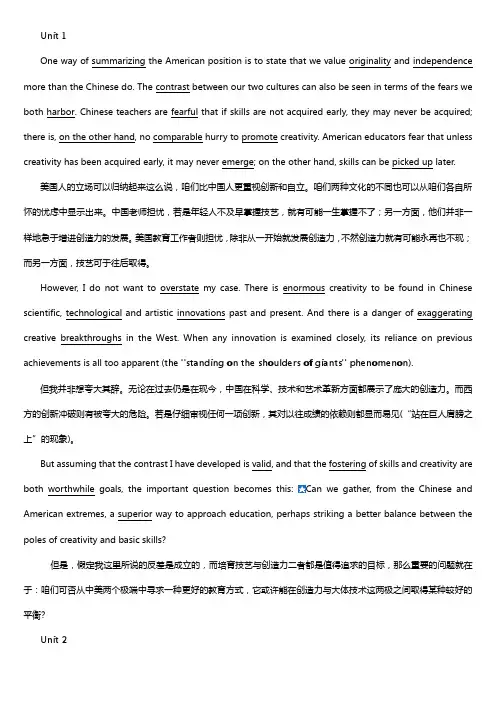
Unit 1One way of summarizing the American position is to state that we value originality and independence more than the Chinese do. The contrast between our two cultures can also be seen in terms of the fears we both harbor. Chinese teachers are fearful that if skills are not acquired early, they may never be acquired; there is, on the other hand, no comparable hurry to promote creativity. American educators fear that unless creativity has been acquired early, it may never emerge; on the other hand, skills can be picked up later.美国人的立场可以归纳起来这么说,咱们比中国人更重视创新和自立。
咱们两种文化的不同也可以从咱们各自所怀的忧虑中显示出来。
中国老师担忧,若是年轻人不及早掌握技艺,就有可能一生掌握不了;另一方面,他们并非一样地急于增进创造力的发展。
美国教育工作者则担忧,除非从一开始就发展创造力,不然创造力就有可能永再也不现;而另一方面,技艺可于往后取得。
However, I do not want to overstate my case. There is enormous creativity to be found in Chinese scientific, technological and artistic innovations past and present. And there is a danger of exaggerating creative breakthroughs in the West. When any innovation is examined closely, its reliance on previous achievements is all too apparent (the "standing on the shoulders of giants" phenomenon).但我并非想夸大其辞。
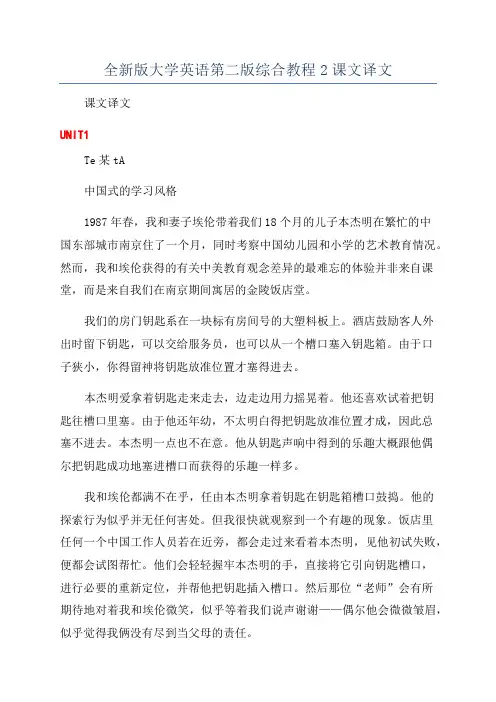
全新版大学英语第二版综合教程2课文译文课文译文UNIT1Te某tA中国式的学习风格1987年春,我和妻子埃伦带着我们18个月的儿子本杰明在繁忙的中国东部城市南京住了一个月,同时考察中国幼儿园和小学的艺术教育情况。
然而,我和埃伦获得的有关中美教育观念差异的最难忘的体验并非来自课堂,而是来自我们在南京期间寓居的金陵饭店堂。
我们的房门钥匙系在一块标有房间号的大塑料板上。
酒店鼓励客人外出时留下钥匙,可以交给服务员,也可以从一个槽口塞入钥匙箱。
由于口子狭小,你得留神将钥匙放准位置才塞得进去。
本杰明爱拿着钥匙走来走去,边走边用力摇晃着。
他还喜欢试着把钥匙往槽口里塞。
由于他还年幼,不太明白得把钥匙放准位置才成,因此总塞不进去。
本杰明一点也不在意。
他从钥匙声响中得到的乐趣大概跟他偶尔把钥匙成功地塞进槽口而获得的乐趣一样多。
我和埃伦都满不在乎,任由本杰明拿着钥匙在钥匙箱槽口鼓捣。
他的探索行为似乎并无任何害处。
但我很快就观察到一个有趣的现象。
饭店里任何一个中国工作人员若在近旁,都会走过来看着本杰明,见他初试失败,便都会试图帮忙。
他们会轻轻握牢本杰明的手,直接将它引向钥匙槽口,进行必要的重新定位,并帮他把钥匙插入槽口。
然后那位“老师”会有所期待地对着我和埃伦微笑,似乎等着我们说声谢谢——偶尔他会微微皱眉,似乎觉得我俩没有尽到当父母的责任。
我的中国同行,除了少数几个人外,对此事的态度与金陵饭店工作人员一样。
既然大人知道怎么把钥匙塞进槽口——这是走近槽口的最终目的,既然孩子还很年幼,还没有灵巧到可以独自完成要做的动作,让他自己瞎折腾会有什么好处呢?他很有可能会灰心丧气发脾气——这当然不是所希望的结果。
为什么不教他怎么做呢?他会高兴,他还能早些学会做这件事,进而去学做更复杂的事,如开门,或索要钥匙——这两件事到时候同样可以(也应该)示范给他看。
我俩颇为同情地听着这一番道理,解释道,首先,我们并不在意本杰明能不能把钥匙塞进钥匙的槽口。
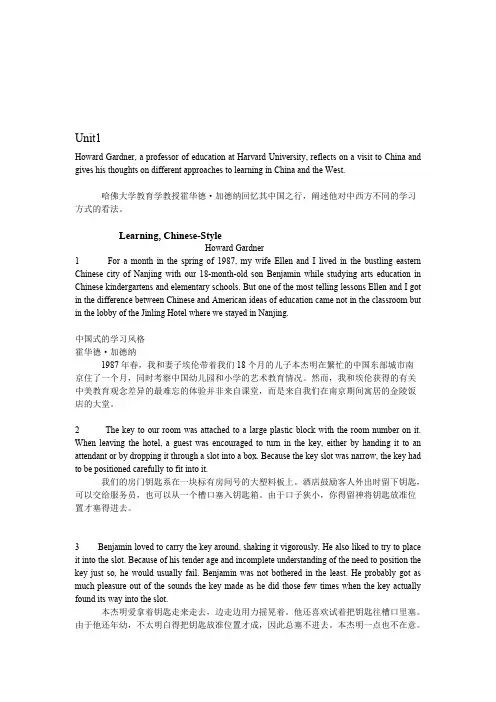
Unit1Howard Gardner, a professor of education at Harvard University, reflects on a visit to China and gives his thoughts on different approaches to learning in China and the West.哈佛大学教育学教授霍华德·加德纳回忆其中国之行,阐述他对中西方不同的学习方式的看法。
Learning, Chinese-StyleHoward Gardner 1 For a month in the spring of 1987, my wife Ellen and I lived in the bustling eastern Chinese city of Nanjing with our 18-month-old son Benjamin while studying arts education in Chinese kindergartens and elementary schools. But one of the most telling lessons Ellen and I got in the difference between Chinese and American ideas of education came not in the classroom but in the lobby of the Jinling Hotel where we stayed in Nanjing.中国式的学习风格霍华德·加德纳1987年春,我和妻子埃伦带着我们18个月的儿子本杰明在繁忙的中国东部城市南京住了一个月,同时考察中国幼儿园和小学的艺术教育情况。
然而,我和埃伦获得的有关中美教育观念差异的最难忘的体验并非来自课堂,而是来自我们在南京期间寓居的金陵饭店的大堂。
Unit1Howard Gardner,a professor of education at Harvard University,reflects on a visit to China and gives his thoughts on different approaches to learning in China and the West.哈佛大学教育学教授霍华德·加德纳回忆其中国之行,阐述他对中西方不同的学习方式的看法.Learning,Chinese—StyleHoward Gardner 1 For a month in the spring of 1987,my wife Ellen and I lived in the bustling eastern Chinese city of Nanjing with our 18—month—old son Benjamin while studying arts education in Chinese kindergartens and elementary schools。
But one of the most telling lessons Ellen and I got in the difference between Chinese and American ideas of education came not in the classroom but in the lobby of the Jinling Hotel where we stayed in Nanjing.中国式的学习风格霍华德·加德纳1987年春,我和妻子埃伦带着我们18个月的儿子本杰明在繁忙的中国东部城市南京住了一个月,同时考察中国幼儿园和小学的艺术教育情况。
然而,我和埃伦获得的有关中美教育观念差异的最难忘的体验并非来自课堂,而是来自我们在南京期间寓居的金陵饭店的大堂。
课文译文UNIT 1TextA中国式的学习风格1987年春,我和妻子埃伦带着我们18个月的儿子本杰明在繁忙的中国东部城市住了一个月,同时考察中国幼儿园和小学的艺术教育情况。
然而,我和埃伦获得的有关中美教育观念差异的最难忘的体验并非来自课堂,而是来自我们在期间寓居的金陵饭店堂。
我们的房门钥匙系在一块标有房间号的大塑料板上。
酒店鼓励客人外出时留下钥匙,可以交给服务员,也可以从一个槽口塞入钥匙箱。
由于口子狭小,你得留神将钥匙放准位置才塞得进去。
本杰明爱拿着钥匙走来走去,边走边用力摇晃着。
他还喜欢试着把钥匙往槽口里塞。
由于他还年幼,不太明白得把钥匙放准位置才成,因此总塞不进去。
本杰明一点也不在意。
他从钥匙声响中得到的乐趣大概跟他偶尔把钥匙成功地塞进槽口而获得的乐趣一样多。
我和埃伦都满不在乎,任由本杰明拿着钥匙在钥匙箱槽口鼓捣。
他的探索行为似乎并无任何害处。
但我很快就观察到一个有趣的现象。
饭店里任何一个中国工作人员若在近旁,都会走过来看着本杰明,见他初试失败,便都会试图帮忙。
他们会轻轻握牢本杰明的手,直接将它引向钥匙槽口,进行必要的重新定位,并帮他把钥匙插入槽口。
然后那位“老师”会有所期待地对着我和埃伦微笑,似乎等着我们说声——偶尔他会微微皱眉,似乎觉得我俩没有尽到当父母的责任。
我很快意识到,这件小事与我们在中国要做的工作直接相关:考察儿童早期教育(尤其是艺术教育)的方式,揭示中国人对创造性活动的态度。
因此,不久我就在与中国教育工作者讨论时谈起了钥匙槽口一事。
两种不同的学习方式我的中国同行,除了少数几个人外,对此事的态度与金陵饭店工作人员一样。
既然大人知道怎么把钥匙塞进槽口——这是走近槽口的最终目的,既然孩子还很年幼,还没有灵巧到可以独自完成要做的动作,让他自己瞎折腾会有什么好处呢?他很有可能会灰心丧气发脾气——这当然不是所希望的结果。
为什么不教他怎么做呢?他会高兴,他还能早些学会做这件事,进而去学做更复杂的事,如开门,或索要钥匙——这两件事到时候同样可以(也应该)示给他看。
全新版大学英语综合教程2的课文翻译II. translation1.1)背离传统需要极大勇气It takes an enormous amount of courage to make a departure from the tradition.2)汤姆过去很腼腆,但这次却非常勇敢能在大庭广众面前上台表演了Tom used to be very shy, but this time he was bold enough to give a performance in front of a large audience.3)很多教育家认为从小培养孩子的创新精神是可取的Many educators think it desirable to foster the creative spirit in the child at an early age.4)假设那幅画确实是名作,你觉得值得购买吗?Assuming this painting really is a masterpiece, do you think it’s worthwhile to buy it?5)如果这些数据统计上是站得住脚的,那他将会帮助我们认识正在调查的问题。
If the data is statistically valid, it will throw light on the problem we are investigating.2.要提高我们的英语水平,关键是多读,多听,多写,多说,此外尽可能多背诵一些好文章也十分重要,如果你脑子你没有储存大量好的英语文章,你就不能用英语自由的表达自己的思想。
一边学一边总结经验也十分重要,因为这样做我们就能搞明白那种学习方法是更有效的能够产生最好的效果,只要我们坚持努力学习到时候我们就会完成掌握英语的任务To improve our English, it is critical to do more reading, writing, listening and speaking. Besides, learning by heart asmany well-written essays as possible is also very important. Without an enormous store of good English writing in your head you cannot express yourself freely in English. It is also helpful to summarize our experience as we go along, for in so doing, we can figure out which way of learning is more effective and will produce the most desirable result. As long as we keep working hard on it, we will in due course accomplish the task of mastering English.II. Translation1.1)研究表明笑能够带来很多健康上的好处Research shows that laughter can bring a lot of health benefits.2)互联网连接速度慢真让人心烦A slow Internet connection speed is really annoying.3)法律规定帮助他人自杀是犯罪As the law stands, helping someone commit suicide is a crime.4)玛丽在她的报告中试图从一个完全不同的角度来解释这些数据In her report, Mary tries to interpret the data from a completely different angle.5)苏是一个很有天赋的女孩,他那惊人的记忆力是他在同班同学中显得格外特殊Sue is a girl of great talent. Her amazing memory sets her apart from her classmates.2.也许你羡慕我,因为我可以借助计算机在家里工作,我也这么想互联网是我的工作方便多了,我可以通过电子邮件撰写,编辑,并交出我的文章,在网上与我的同事聊天,与老板讨论工作。
Unit1Howard Gardner, a professor of education at Harvard University, reflects on a visit to China and gives his thoughts on different approaches to learning in China and the West.哈佛大学教育学教授霍华德·加德纳回忆其中国之行,阐述他对中西方不同的学习方式的看法。
Learning, Chinese-StyleHoward Gardner 1 For a month in the spring of 1987, my wife Ellen and I lived in the bustling eastern Chinese city of Nanjing with our 18-month-old son Benjamin while studying arts education in Chinese kindergartens and elementary schools. But one of the most telling lessons Ellen and I got in the difference between Chinese and American ideas of education came not in the classroom but in the lobby of the Jinling Hotel where we stayed in Nanjing.中国式的学习风格霍华德·加德纳1987年春,我和妻子埃伦带着我们18个月的儿子本杰明在繁忙的中国东部城市南京住了一个月,同时考察中国幼儿园和小学的艺术教育情况。
然而,我和埃伦获得的有关中美教育观念差异的最难忘的体验并非来自课堂,而是来自我们在南京期间寓居的金陵饭店的大堂。
One way of summarizing the American position is to state that we value originality and independence more than the Chinese do. The contrast between our two cultures can also be seen in terms of the fears we both harbor. Chinese teachers are fearful that if skills are not acquired early, they may never be acquired; there is, on the other hand, no comparable hurry to promote creativity. American educators fear that unless creativity has been acquired early, it may never emerge; on the other hand, skills can be picked up later.However, I do not want to overstate my case. There is enormous creativity to be found in Chinese scientific, technological and artistic innovations past and present. And there is a danger of exaggerating creative breakthroughs in the West. When any innovation is examined closely, its reliance on previous achievements is all too apparent (the "standing on the shoulders of giants" phenomenon).But assuming that the contrast I have developed is valid, and that the fostering of skills and creativity are both worthwhile goals, the important question becomes this: Can we gather, from the Chinese and American extremes, a superior way to approach education, perhaps striking a better balance between the poles of creativity and basic skills?Walton set up a college scholarship fund for employees' children, a disaster relief fund to rebuild employee homes damaged by fires, floods, tornadoes, and the like. He believed in cultivating ideas and rewarding success."He'd say, 'That fellow worked hard, let's give him a little extra,'" recalls retired president Ferold F. Arend, who was stunned at such generosity after the stingy employer he left to join Wal-Mart. "I had to change my way of thinking when I came aboard.""The reason for our success," says Walton, in a company handout, "is our people and the way they're treated and the way they feel about their company. They believe things are different here, but they deserve the credit."Adds company lawyer Jim Hendren: "I've never seen anyone yet who worked for him or was around him for any length of time who wasn't better off. And I don't mean just financially, although a lot of people are. It's just something about him -- coming into contact with Sam Walton just makes you a better person."Making the journey from log cabin to White House is part of the American Dream. But when Jimmy Carter was defeated in his attempt to gain a second term as President of the United States he found himself suddenly thrown out of the White House and back in his log cabin. This is how he coped.SEAN: If that sort of thing happened only once in a while, it wouldn't be so bad. Overall, I wouldn't want to trade my dad for anyone else's. He loves us kids and Mom too. But I think that's sometimes the problem. He wants to do things for us, things he thinks are good. But he needs to give them more thought because:SEAN, HEIDI and DIANE: (In unison) Father knows better!(The lights quickly fade to black and then come up a second or two later. DIANE stands alone at the Down Right edge of the stage. HEIDI and SEAN enter Down Left and cross to the edge of the stage. )DIANE: Can you imagine how humiliated I was? An honor student, class president. And Father was out asking people to have their sons call and ask me to the prom! But that's dear old dad. Actually, he is a dear. He just doesn't stop to think. And it's not just one of us who've felt the heavy hand of interference. Oh, no, all three of us live in constant dread knowing that at any time disaster can strike because: Father knows better.I'd never realized how important daily routine is: dressing for work, sleeping normal hours. I'd never thought I relied so much on co-workers for company. I began to understand why long-term unemployment can be so damaging, why life without an externally supported daily plan can lead to higher rates of drug abuse, crime, suicide.To restore balance to my life, I force myself back into the real world. I call people, arrange to meet with the few remaining friends who haven't fled New York City. I try to at least get to the gym, so as to set apart the weekend from the rest of my week. I arrange interviews for stories, doctor's appointments -- anything to get me out of the house and connected with others.But sometimes being face to face is too much. I see a friend and her ringing laughter is intolerable -- the noise of conversation in the restaurant, unbearable. I make my excuses and flee. I re-enter my apartment and run to the computer as though it were a place of safety.I click on the modem, the once-annoying sound of the connection now as pleasant as my favorite tune. I enter my password. The real world disappears.Thought you were safe sharing secrets with Internet friends? Wait for the doorbell...The runway felt different this time. It startled him for a brief moment. Then it all hit him like a wet bale of hay. The bar was set at nine inches higher than his personal best. That's only one inch off the National record, he thought. The intensity of the moment filled his mind with anxiety. He began shaking the tension. It wasn't working. He became more tense. Why was this happening to him now, he thought. He began to get nervous. Afraid would be a more accurate description. What was he going to do? He had never experienced these feelings. Then out of nowhere, and from the deepest depths of his soul, he pictured his mother. Why now? What was his mother doing in his thoughts at a time like this? It was simple. His mother always used to tell him when you felt tense, anxious or even scared, take deep breaths.So he did. Along with shaking the tension from his legs, he gently laid his pole at his feet. He began to stretch out his arms and upper body. The light breeze that was once there was now gone. He carefully picked up his pole. He felt his heart pounding. He was sure the crowd did, too. The silence was deafening. When he heard the singing of some distant birds in flight, he knew it was his time to fly.Racing the clock every day is such an exhausting effort that when I actually have a few free moments, I tend to collapse. Mostly I sink into a chair and stare into space while I imagine how lovely life would be if only I possessed the organizational skills and the energy of my superheroines. In fact, I waste a good deal of my spare time just worrying about what other women are accomplishing in theirs. Sometimes I think that these modern fairy tales create as many problems for women as the old stories that had us biding our time for the day our prince would come.Yet superwomen tales continue to charm me. Despite my friend's warning against being taken in, despite everything I've learned, I find that I'm not only willing, but positively eager to buy that bridge she mentioned. Why? I suppose it has something to do with the appeal of an optimistic approach to life -- and the fact that extraordinary deeds have been accomplished by determined individuals who refused to believe that "you can't" was the final word on their dreams.Men have generally been assured that achieving their heart's desires would be a piece of cake. Women, of course, have always believed that we can't have our cake and eat it too-the old low-dream diet. Perhaps becoming a superwoman is an impossible dream for me, but life without that kind of fantasy is as unappealing as a diet with no treats.1) The young woman described to the policemen the way the man ran up to her and grabbed the bag from her hand. 2) All the people working for Sam Walton admire the way he manages Wal-Mart and the way he treats his employees. 3) The neighbors were disgusted at the way he talked to his old father.4) It's amazing the way the eight-year-old boy managed to stay so calm when he faced the emergency.1. You will find yourself penniless in a month.2. He found himself lying in a hospital ward.3. She found herself faced with the toughest job she had ever taken.4. Susan found herself in a trap from which she could not escape.1) Obviously what the speaker wanted to emphasize was the impact of these findings rather than the process that led to these findings.2) It seems that he is never bothered about what people would think about his behavior.3) The CEO never hesitates to let his employees know what he is planning for the company.4) The scientist will show the audience what a tele-operated robot can do for a family.5)Despite all this she manages to get her act together.1、She herself believed in freedom,so much so that she would rather die than live without it.2、Assuming the proposal is accepted,where are we going to get the money?3、Only by rewarding success can you bring out the best in your employess.4、It’s amazing the eight-year-old boy managed to stay so calm when he faced the emergency.5、Allen should have known better than to lend such a large sum of money to that untrustworthy cousin of his.。